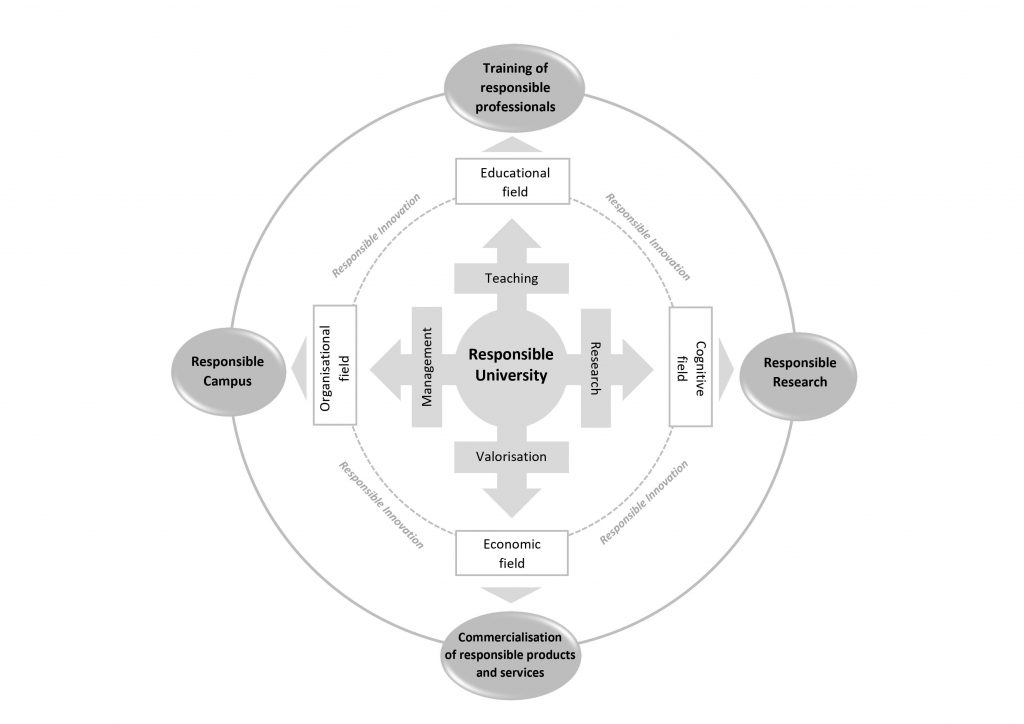Towards the Responsible University: a label as a lever for responsible innovation
The Covid-19 crisis has raised awareness of the need for all organisations to take greater responsibility building a more sustainable society. This is the case for companies, but also for universities in their teaching, research, and valorisation missions.
Universities, with their research laboratories and educational teams, have the mission to produce scientific knowledge and to train future decision-makers. They are naturally intended to tackle the challenges of ecological transition and sustainable development. Several institutions, both international and regional have contributed to the promotion of social responsibility in higher education. For example, WHO (1995), UNESCO (1998, 2009), CDESR (2006), OECD (2010) and EU (2015), which integrate university social responsibility into the broader framework of sustainable development.
At the heart of knowledge societies and innovation ecosystems, universities cannot escape from the principle of social responsibility which goes far beyond their internal stakeholders. The EU-USR project (2015) defines University Social Responsibility (USR) as “the responsibility of universities for the impacts of their decisions and activities on society and the environment through transparent and ethical strategies”.
But the question is “by what means does the university achieve positive impacts and with what results?”
For French universities, the Grenelle 1 law (2009) has been a key factor in the implementation of USR policy. This legal framework has been of major importance for the use of sustainable development labels in the university context. For universities, a label then becomes a certification obtained for having placed actions in favour of sustainable development and social responsibility at the heart of their strategies. However, the existing labels are for the most part too general on sustainable development and not specific to the core activities of the university.
Labels that are more action-oriented, through responsible innovations, are needed. Gone are the days when researchers and theoreticians function were “to do nothing and observe everything”, as Adam Smith explained in The Wealth of Nations (1776)!
Responsible innovation enables organisations to transform themselves and develop products, services, and processes with a positive impact on society and the environment. To encourage the French-speaking academic institutions in the world to implement responsible forms of innovation, AUF in cooperation with RNI and partners, launched since October 2020 the “Label Francophone d’Innovation Responsable”. This label is in line with the Sustainable Development Goals to encourage academic institutions to contribute to their achievement and to become “socially responsible”.
Thus, we can consider that university is responsible when it develops responsible innovations in 4 types of fields:
Source: Mobhe-Bokoko
1/ Responsible innovations in the organisational field are mainly related to good governance, ethical management of the academic administration, a better ecological footprint, and consideration of the concerns of internal and external stakeholders. They aim at building a responsible campus.
2/ In the educational field, they are linked to the integration of sustainable development and social responsibility in university curriculum. They encourage a comprehensive approach to teaching, allowing for a better transmission of knowledge in connection with current societal challenges. These responsible innovations aim to offer training to assist responsible professionals emerge.
3/ In the cognitive field, responsible innovations are linked to the production and dissemination of socially relevant knowledge. They lead to the elaboration of research agendas integrating the challenge of sustainable development, to the integration of ethics and the participatory research processes, to the accessibility and vulgarisation of research results.
4/ In the economic field, responsible innovations target the commercialisation of research products and the transfer of technologies to economic actors in response to current and future societal challenges. Through responsible innovation, the valorisation of research (patent, university spin-off, consultancy, etc.) integrates issues of sustainable development.
Historically considered to be the privileged source of diversified knowledge accessible to all, the recent evolution of universities (massification, autonomy, multiplication of missions…) leads to question their role, their position in society and their “responsibility”. The « Label Francophone de l’Innovation Responsable » is therefore presented as a tool to support universities in the implementation of responsible innovation projects. The criteria of the label make it possible to evaluate the impacts of the process and results of responsible innovations in the university context.
Dave MOBHE BOKOKO
ISI/Lab.RII, Université du Littoral Côté d’Opale
Call for interest


